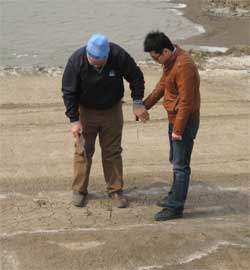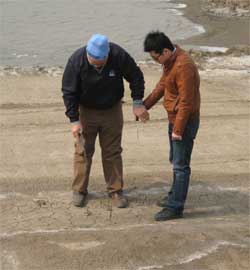 KINGSTON, R.I. – January 6, 2012 –Two or three container ships will leave Rhode Island waters next March for Caofeidian, China containing plant materials and other goods carefully selected by University of Rhode Island plant scientist W. Michael Sullivan.
KINGSTON, R.I. – January 6, 2012 –Two or three container ships will leave Rhode Island waters next March for Caofeidian, China containing plant materials and other goods carefully selected by University of Rhode Island plant scientist W. Michael Sullivan.
Caofeidian, the largest man-made island in the world, was formed by sucking and then drying the sand out of the Yellow Sea, creating a deepwater seaport twice the size of the much-heralded Palm Island in Dubai.
Caofeidian boasts a 50-square kilometer development zone that’s still under construction. The island is already home to China’s largest steel mill and biggest container port in the world. China designed the island to be a model of an environmentally friendly industrial base.
Yet the island has some of the saltiest soil in the world. Trying to get something environmentally friendly to grow and thrive there has already stumped two national teams from Sweden and Japan.
“China is now where the U.S. was environmentally in the late ‘40s and early ‘50s,” said Mark Cheung, an entrepreneur who divides his time between homes in New Hampshire and Hong Kong. “China wants to grow sustainability and live in harmony with nature and has designated nearly $150 million to accomplish that goal.”
Cheung discovered the University’s plant science expertise by chance when he became interested in the URI Foundation’s boat program and met Sharon Pavignano, assistant director of the Foundation’s Corporate and Foundation Relations. “I’ve become fascinated with the technology at URI,” says the 52-year-old Chinese-born businessman who won a scholarship to college in Nova Scotia and later earned an economics degree. One of Cheung’s companies, Sino Development Corp., is funding the three-year, $100,000 URI project.
The plant material being shipped will help transform three acres of residential land on Caofeidian. Currently, one million residents live on the island. The population is expected to reach 4 million when the island is fully developed.
Sullivan’s challenge is to turn that moonscape-like site into a flourishing demonstration garden. In addition to its high salt content, the sand/land lacks moisture, resulting in layers of sand on everything when the wind blows.
The initial focus will be on turf grass and utility grasses that can supply soil stabilization. Sullivan’s plans call for high quality plants that not only possess a superior tolerance to the land’s nearly lethal salt conditions, but also are aesthetically attractive. He will employ a variety of color, textures, and blooms that are reflective of their Chinese environment.
For example, Sullivan will ship cuttings from the Honey locust, Gleditsia triacanthos a deciduous tree native to America that resembles the Chinese Honey Locust, but is more salt tolerant. Sullivan will also send 15 different cultivars of spirea, a shrub that’s attractive yet unkempt, good in mass plantings, and has a reasonable salt tolerance.
The 500 soil-less plants that will be shipped will receive some TLC in a controlled nursery near the site. Sullivan is overseeing the establishment of the first 100 plants that were air freight shipped there late last month.
One of the acres will be a demonstration vegetable garden for freshness and sustainability, in line with best practices promoted in the states. The acre will be devoted to growing fruits, vegetables, grains, fodder, and beverage crops.
There is zero soil organic matter at the site, a vital ingredient needed to create a more favorable condition for plant development and success. An alternative source was found in Massachusetts: 20 tons of pretreated Boston sludge, heated to 500 degrees and turned into sterile, dry, organic pellets. The pellets, which are light and easy to ship, decay slowly to make inexpensive, but effective organic fertilizer.
These demonstration plantings will be nurtured by both Chinese student workers and by visiting URI undergraduates who will accompany Sullivan at different times of the year.
Sullivan joined URI in 1981. His research focuses on land use management and the applications of science in urbanizing areas. He is particularly interested in management practices and their impact or potential impact on water quality. He has authored scores of articles in scientific journals and is a member of the American Society of Agronomy, the Soil Science Society of America, and the Crop Science Society of America.
In 2005, then Gov. Donald L. Carcieri appointed Sullivan director of the Department of Environmental Management where he oversaw a broad range of environmental programs, ranging from permitting and enforcement to fish and wildlife, agriculture, forest, open space preservation, and management of the state’s parks and beaches. He left the directorship and returned to campus last January.
Mike Sullivan and a Chinese student.
Photo courtesy of Sharon Pavignano, URI Foundation

